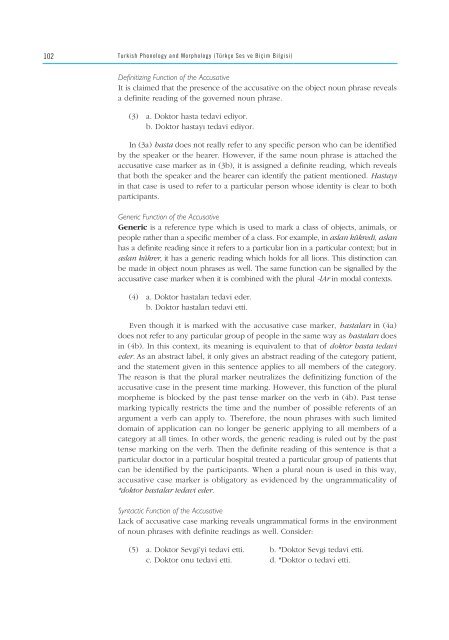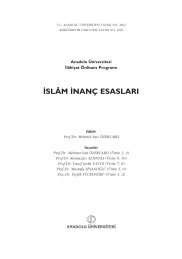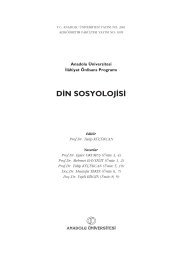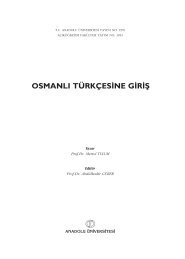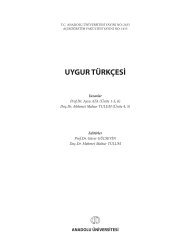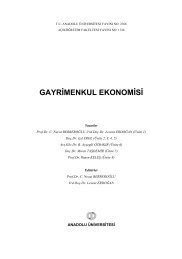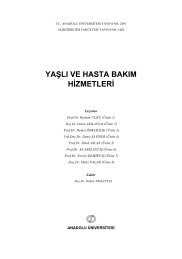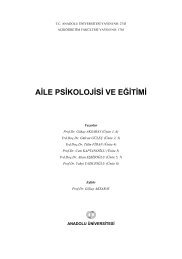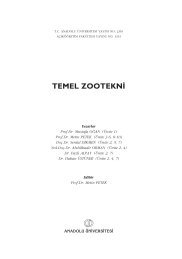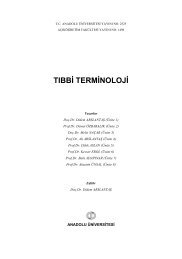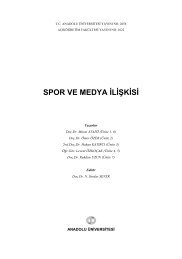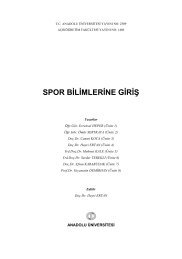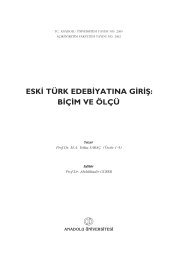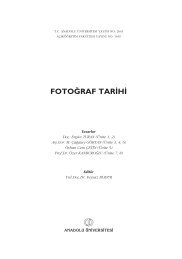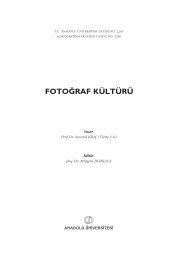turkish phonology and morphology (türkçe ses ve b‹ç‹mb‹lg‹s‹)
turkish phonology and morphology (türkçe ses ve b‹ç‹mb‹lg‹s‹)
turkish phonology and morphology (türkçe ses ve b‹ç‹mb‹lg‹s‹)
Create successful ePaper yourself
Turn your PDF publications into a flip-book with our unique Google optimized e-Paper software.
102<br />
Turkish Phonology <strong>and</strong> Morphology (Türkçe Ses <strong>ve</strong> Biçim Bilgisi)<br />
Definitizing Function of the Accusati<strong>ve</strong><br />
It is claimed that the presence of the accusati<strong>ve</strong> on the object noun phrase re<strong>ve</strong>als<br />
a definite reading of the go<strong>ve</strong>rned noun phrase.<br />
(3) a. Doktor hasta tedavi ediyor.<br />
b. Doktor hastay› tedavi ediyor.<br />
In (3a) hasta does not really refer to any specific person who can be identified<br />
by the speaker or the hearer. Howe<strong>ve</strong>r, if the same noun phrase is attached the<br />
accusati<strong>ve</strong> case marker as in (3b), it is assigned a definite reading, which re<strong>ve</strong>als<br />
that both the speaker <strong>and</strong> the hearer can identify the patient mentioned. Hastay›<br />
in that case is used to refer to a particular person whose identity is clear to both<br />
participants.<br />
Generic Function of the Accusati<strong>ve</strong><br />
Generic is a reference type which is used to mark a class of objects, animals, or<br />
people rather than a specific member of a class. For example, in aslan kükredi, aslan<br />
has a definite reading since it refers to a particular lion in a particular context; but in<br />
aslan kükrer, it has a generic reading which holds for all lions. This distinction can<br />
be made in object noun phra<strong>ses</strong> as well. The same function can be signalled by the<br />
accusati<strong>ve</strong> case marker when it is combined with the plural -lAr in modal contexts.<br />
(4) a. Doktor hastalar› tedavi eder.<br />
b. Doktor hastalar› tedavi etti.<br />
E<strong>ve</strong>n though it is marked with the accusati<strong>ve</strong> case marker, hastalar› in (4a)<br />
does not refer to any particular group of people in the same way as hastalar› does<br />
in (4b). In this context, its meaning is equivalent to that of doktor hasta tedavi<br />
eder. As an abstract label, it only gi<strong>ve</strong>s an abstract reading of the category patient,<br />
<strong>and</strong> the statement gi<strong>ve</strong>n in this sentence applies to all members of the category.<br />
The reason is that the plural marker neutralizes the definitizing function of the<br />
accusati<strong>ve</strong> case in the present time marking. Howe<strong>ve</strong>r, this function of the plural<br />
morpheme is blocked by the past tense marker on the <strong>ve</strong>rb in (4b). Past tense<br />
marking typically restricts the time <strong>and</strong> the number of possible referents of an<br />
argument a <strong>ve</strong>rb can apply to. Therefore, the noun phra<strong>ses</strong> with such limited<br />
domain of application can no longer be generic applying to all members of a<br />
category at all times. In other words, the generic reading is ruled out by the past<br />
tense marking on the <strong>ve</strong>rb. Then the definite reading of this sentence is that a<br />
particular doctor in a particular hospital treated a particular group of patients that<br />
can be identified by the participants. When a plural noun is used in this way,<br />
accusati<strong>ve</strong> case marker is obligatory as evidenced by the ungrammaticality of<br />
*doktor hastalar tedavi eder.<br />
Syntactic Function of the Accusati<strong>ve</strong><br />
Lack of accusati<strong>ve</strong> case marking re<strong>ve</strong>als ungrammatical forms in the environment<br />
of noun phra<strong>ses</strong> with definite readings as well. Consider:<br />
(5) a. Doktor Sevgi’yi tedavi etti. b. *Doktor Sevgi tedavi etti.<br />
c. Doktor onu tedavi etti. d. *Doktor o tedavi etti.


